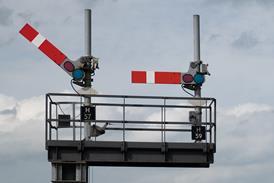ONAPRIL 24 Amtrak President David Gunn outlined an $8bn, five-year plan to repair and replace outdated infrastructure and rolling stock while retaining much of the US network of long distance trains. It would require $4·5bn for capital funding and $3·5bn in operating subsidies in fiscal years 2004 to 2009. Proposals include purchase of 14 DMUs for routes linking New Haven, Connecticut with Springfield, Massachusetts and Chicago with Milwaukee. Gunn also wants to buy new loco-hauled coaches and rehabilitate others, to renew catenary from New York to New Haven and carry out badly-needed repairs to the wires between New York and Washington DC. He would relay 435 km of track, replace or repair many bridges, update dispatching and communications in the Northeast Corridor and overhaul numerous stations.
Gunn’s announcement may have been timed to trump a long-awaited message from the Bush administration outlining its own vision for US passenger services. That happened on April 29 when Deputy Transportation Secretary Michael P Jackson testified before the Senate Committee on Commerce, Science & Transportation. Jackson revealed a six-year plan that would separate the Northeast Corridor from the rest, and shift much of the long-distance network’s financial burden to the states.
The NEC would pass to a new organisation formed of states along the route plus the federal government that would lease the infrastructure for 99 years. The company could then apply to Washington for capital grants to upgrade older sections south of New Haven, but borrowing from the private sector would also be allowed. In addition, Amtrak’s NEC division would be split into companies handling operations and maintenance which would eventually be opened up to competition.
To keep long distance services running, regional organisations could be formed by single states or groups, but they would have to pay all operating costs. As with the NEC, operating rights would ultimately be open to bids from the private sector. The government also proposes to offer federal grants to states wishing to start new, short-distance routes.
Jackson assured Congress that the programme is not a ’Trojan horse’ to get rid of the passenger trains. ’I personally think that the nation will see more rather than less passenger service,’ he said.




















